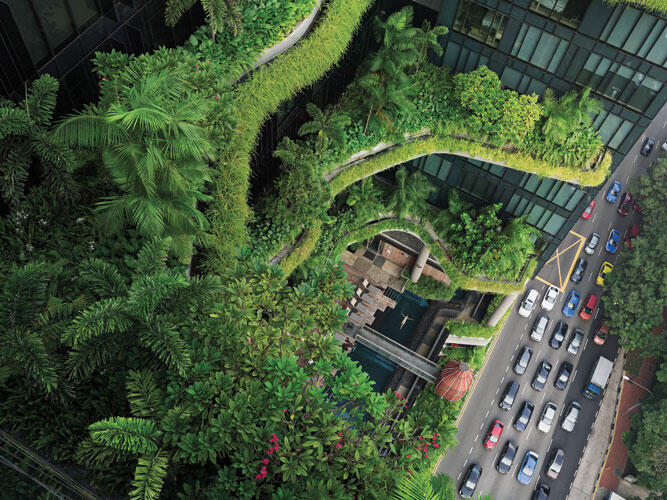In his new series, “Human Nature,” Lucas Foglia finds new ways to grapple with a well-worn subject: humanity’s effect on the natural world. The California-based photographer isn’t a frontline environmentalist, but over the course of his project, which draws on photographs he has made over 12 years, he has come to see that all things are connected. We only thrive if the planet thrives.
“A healthy environment should be considered a human right, and our responsibility,” says Foglia. “As such we should choose our lifestyles to minimize our impact on the world we are a part of.”
Underpinning “Human Nature” is the disturbing notion that perhaps only a few places in this world remain unaltered. Hawaii’s molten lava fields, by virtue of their constant reformation and extreme heat, are the only pristine lands Foglia says he encountered during his extensive survey. Culled from more that 80,000 images and debuting this fall as a 96-page book (Nazraeli) and traveling exhibition, “Human Nature” journeys from Nevada ranchlands to constructed paradises in Singapore, from a farm in a New York City jail to a research station on an Alaska glacier.
Foglia not only documents ice floes, clear-cut forests, green urbanism and other common climate change subjects, he meditates on what nature has become and how we interact emotionally, or not, with our planet
He also pulls back the veil on the work of earth scientists. Having resolved that most places on earth had been visited, documented and altered, Foglia decided to demystify the labor behind our understanding of the planet. “I started photographing scientists who measured the air. Amidst all of the news stories and political arguments about climate change, most people don’t know what the process of the science looks like,” he says.
Following the science became a useful way to focus the project. Foglia photographed field researchers at the Guyana Forestry Commission, the Juneau Icefield Research Program, the NOAA Observatories and USDA Agricultural Research Stations. The scientists granted Foglia free access because, he says, they recognized that he was intent, like they are, on describing the world fairly. “We shared a common cause,” he says.
While it includes photos made over the course of more than a decade, Foglia’s project started to come together after Hurricane Sandy inundated the farm he grew up on 30 miles east of New York City. He knew climate change was a crucial topic but he could not have predicted how politically abused it would become. The Trump administration has proposed cutting NOAA’s budget by 17 percent, including a 26 percent cut to research. “Most of the scientists I photographed are at risk of losing funding,” Foglia notes.
Foglia also observed neurologists’ experiments that measure how the environment influences human behavior and cognition. “The average American, according to the Environmental Protection Agency, currently spends 93 percent of their life indoors,” explains Foglia. “I photographed neuroscientists measuring how spending time in nature benefits us, using science to encourage people to go outside.”
In one image of the University of Utah’s “Cognition in the Wild Study,” which uses EEGs (electroencephalogram) to measure brain response to natural surroundings, a young woman perches at the edge of a desert canyon with her head wired to a laptop. In the Swedish University of Agricultural Sciences’ Bosch Lab, a subject sits with head tilted back in a VR-headset. She bathes in the glow of a screen-projected forest. Scientists are measuring the degree to which virtual reality versions of nature reduce stress. The image sparks a number of disconcerting questions. Might our dislocation from nature be assuaged only by more analytics and technological experiment? If we cannot reverse losses in the physical world, how might we recreate or restore our connections to it?
“Human Nature” avoids polemic. It doesn’t shout; it whispers uncomfortable truths. The book moves through topographic themes: first, in cities and woodlands and laboratories, and later, across farms, deserts, ice fields and oceans. It opens and closes with what Foglia calls “interpretations of paradise.” For corporations, paradise is an elaborate terrace of urban forest, or a McDonald’s with a lawn for a roof. Individuals, by comparison, find paradise by stripping down, climbing trees, sinking into pools and having sex in tropical bushes. In all cases, Foglia reveals to us our world anew.
Often, photographs intended to raise public awareness succeed when they are good-looking. Of course, there’s a tension in this icky visual seduction. The photo of an animal in peril is another trope. Both types of images manipulate viewers (mostly harmlessly) and reinforce what we expect environmental photography to be. “Human Nature” does something entirely different. It delivers a vision of a world with which we are in communication, not in ever-increasing detachment. Foglia points to, and believes in, our agency.
“We need to change our lifestyles,” says Foglia. “Spending more time outside, eating less meat, traveling by bicycle or public transportation, and preserving forests would be good first steps.”
In Foglia’s world, small-hold biodynamic orchards are just as important as state regulations on the lumber industry. Harvesting spinach at daybreak will tell us as much about nature as the scientist who monitors brain activity. If we are for the world, it will be for us. Foglia’s sometimes deadpan and always beautiful images in “Human Nature” are, arguably, source for optimism. We’re building responses and raising consciousness. We remain curious. The answers are within us.
Source: http://bit.ly/2zkZKTl











